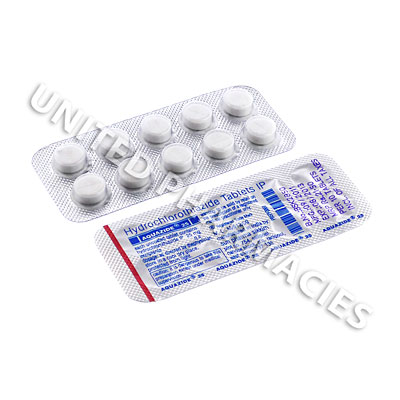Customers also like
Accuretic (Quinapril Hydrochloride) - 20mg/12.5mg (30 Tablets)
our best price : $16.19
Biduret (Amiloride Hydrochloride/Hydrochlorothiazide) - 5/50mg (10 Tablets)
our best price : $7.25
Cipril H (Lisinopril/Hydrochlorothiazide) - 5mg/12.5mg (10 Tablet)
our best price : $3.57
Olmecip H (Olmesartan Medoxomil/Hydrochlorothiazide) - 20mg/12.5mg (10 Tablet)
our best price : $5.77
Irovel H (Irbesartan/Hydrochlorothiazide) - 150mg/12.5mg (10 Tablets)
our best price : $6.62
Kiklin (Bixalomer) - 250mg (100 Capsules)
our best price : $69.20
Luprac (Trasemide) - 4mg (100 Tablets)
our best price : $86.22
Description
Aquazide (Hydrochlorothiazide) is used in the treatment of high blood pressure and other conditions that require the elimination of excess fluid (water) from the body. These conditions include congestive heart failure, cirrhosis of the liver, corticosteroid and estrogen therapy, and kidney disorders. When used for high blood pressure, it can be used alone or with other high blood pressure medications. Hydrochlorothiazide contains a form of thiazide, a diuretic that prompts your body to produce and eliminate more urine, which helps lower blood pressure.
If you have high blood pressure, you must take Hydrochlorothiazide regularly for it to be effective. Since blood pressure declines gradually, it may be several weeks before you get the full benefit of it. You must continue taking it even if you are feeling well. This drug does not cure high blood pressure, it merely keeps it under control.
Take Hydrochlorothiazide exactly as prescribed by your doctor. Dosage should be adjusted to each individual`s needs. The smallest dose that is effective should be used.
The usual dose for adults treating water retention is 25mg to 100mg per day. Your doctor may tell you to take the drug in a single dose or to divide the total amount into more than one dose. Your doctor may put you on a day on, day off schedule or some other alternate day schedule to suit your needs.
The usual dose for high blood pressure is 25mg as a single dose. Your doctor may increase the dose to 50mg, as a single dose or divided into 2 doses. Dosages should be adjusted when used with other high blood pressure medications.
Side effects cannot be anticipated. If any develop or change in intensity, inform your doctor as soon as possible. Only your doctor can determine if it is safe for you to continue taking Hydrochlorothiazide.
Side effects may include: Abdominal cramping, diarrhea, dizziness upon standing up, headache, loss of appetite, low blood pressure, low potassium (leading to symptoms such as dry mouth, excessive thirst, weak or irregular heartbeat, muscle pain or cramps), stomach irritation, stomach upset, weakness.
Less common or rare side effects may include: Anemia, blood disorders, changes in blood sugar, constipation, difficulty breathing, dizziness, fever, fluid in the lung, hair loss, high levels of sugar in the urine, hives, hypersensitivity reactions, impotence, inflammation of the lung, inflammation of the pancreas, inflammation of the salivary glands, kidney failure, muscle spasms, nausea, rash, reddish or purplish spots on the skin, restlessness, sensitivity to light, skin disorders including Stevens-Johnson syndrome (blisters in the mouth and eyes), skin peeling, tingling or pins and needles, vertigo, vision changes, vomiting, yellow eyes and skin.
If you are unable to urinate, you should not take this medication. If you are sensitive to or have ever had an allergic reaction to Hydrochlorothiazide or similar drugs, or if you are sensitive to sulfa or other sulfonamide-derived drugs, you should not take this medication.
Diuretics can cause your body to lose too much potassium. Signs of an excessively low potassium level include muscle weakness and rapid or irregular heartbeat. To boost your potassium level, your doctor may recommend eating potassium-rich foods or taking a potassium supplement.
If you are taking Hydrochlorothiazide, your kidney function should be given a complete assessment, and should continue to be monitored.
If you have an allergic or hypersensitive reaction, seek emergency medical attention. Possible symptoms include difficulty breathing, difficulty swallowing, swelling, chest tightness, skin rashes, and hives.
Aquazide (Hydrochlorothiazide) should only be used as instructed and prescribed by your physician or pharmacist. Do not alter your dosage unless specifically instructed to do so by either of the above. Dosage and usage often depends on the severity of the condition, as well as the patient`s medical history and current health condition.
Before you begin using this medication, ensure your physician is aware of the following:
- If you are pregnant or breastfeeding.
- If you have any allergies.
- If you have any other illnesses, disorders, or medical conditions.
- If you are using any other drugs or medication.
- If you are using any vitamins or supplements.
















